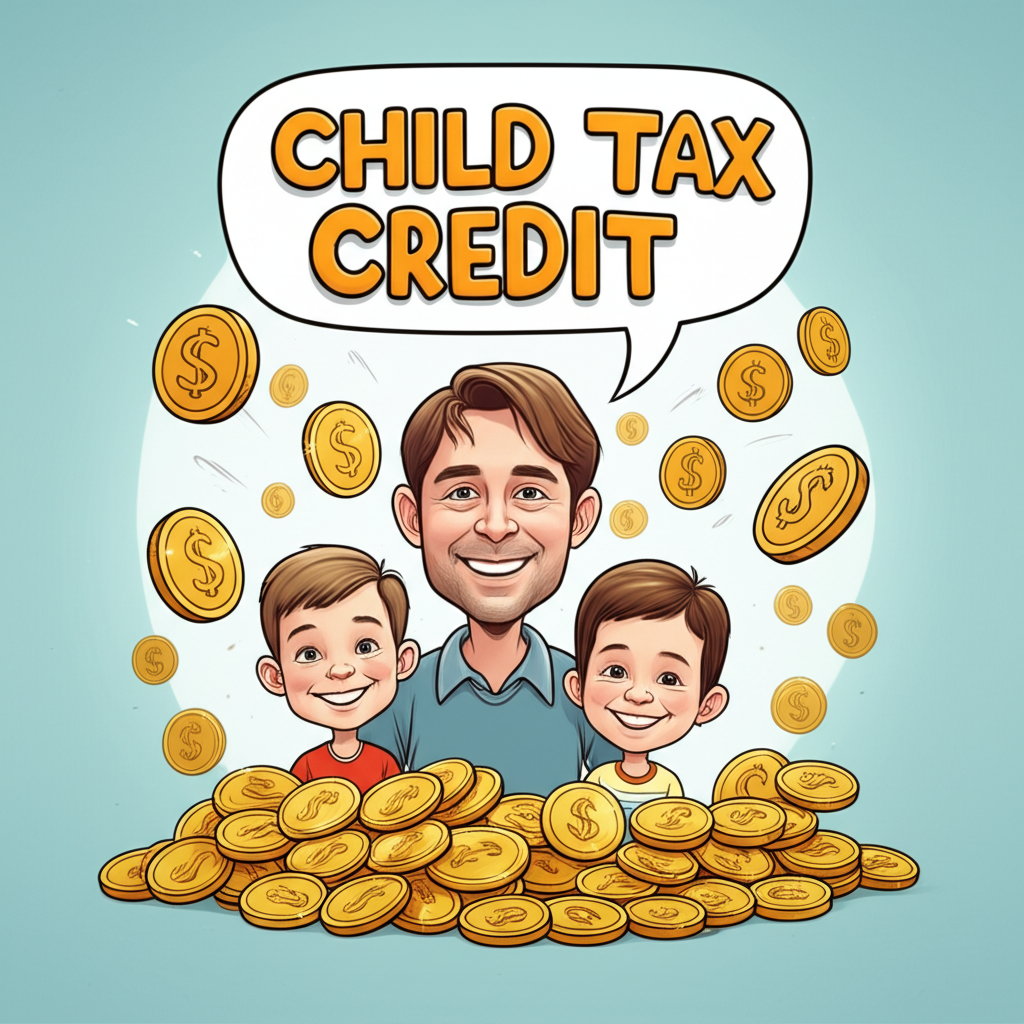
Article 1: The Child Tax Credit: Or, How We Briefly Became Millionaires (Until We Remembered Diapers)
By Penelope "Pennies" Pinchington, Financial Satirist & Exhausted Parent
Ah, the Child Tax Credit. A phrase that, for a fleeting moment each month (or year, depending on the legislative whims of the universe), transforms the average, sleep-deprived parent into a benevolent financial titan. Forget cryptocurrency, forget the stock market – the real thrill ride of the modern economy is the ding of your bank account notification, signaling the arrival of your monthly stipend from Uncle Sam, presumably delivered by a stork wearing a tiny top hat.
For those blissfully unaware (perhaps you’re a recent empty-nester or a highly disciplined hermit), the Child Tax Credit is a government initiative designed to help families with the astronomical costs of raising tiny, demanding humans. It’s essentially the government saying, "We see you, parents. We see the coffee stains, the permanent marker on the walls, and the unyielding desire for five uninterrupted minutes in the bathroom. Here’s some cash. Don’t spend it all on organic kale snacks."
Upon its arrival, a curious phenomenon occurs. The initial thought is always noble: "This will go straight into their college fund!" Or, "Finally, we can afford that new roof!" But then, the primal, parental brain kicks in. The one that hasn’t had a full night’s sleep since 2018.
The Seven Stages of Child Tax Credit Delusion:
- The "Philanthropic Overlord" Phase: You briefly consider adopting another child, just to maximize your government-sponsored largesse. (Don’t worry, the feeling passes when your current toddler screams for a juice box.)
- The "Luxury Essential" Phase: That basic pack of diapers? Pfft. You’re now eyeing the eco-friendly, bamboo-infused, sustainably sourced, artisanal diapers that cost more than your first car payment. "It’s for the baby’s comfort," you declare, ignoring the fact the baby will just poop in them.
- The "Parental Indulgence (Disguised as Kid-Related)" Phase: That new 65-inch TV? It’s "for family movie nights." The fancy espresso machine? "To keep me awake to parent them better." The noise-canceling headphones? "To drown out the incessant questions about why the sky is blue."
- The "Briefcase Full of Toys" Phase: Your living room is already a minefield of plastic. But now, armed with your CTC, you’re convinced that this time, the new, talking, light-up, self-cleaning robot dog will finally bring peace to the household. (It won’t. It will just add to the noise.)
- The "Eat Out! We’re Rich!" Phase: For one glorious evening, you eschew the usual mac-and-cheese-on-a-Tuesday and venture to a restaurant where the kids’ menu isn’t just "chicken nuggets or nothing." You even order appetizers! And a dessert! Then you remember the cost of childcare for the evening and realize you’re back to ramen.
- The "Wait, Where Did It Go?" Phase: Blink. And it’s gone. Like a toddler with a cookie, it vanished. Was it the 17 trips to Target? The emergency visit to replace a lost pacifier? The sudden, inexplicable need for glow-in-the-dark bath toys? The mystery remains.
- The "Resigned Optimism" Phase: You shrug. You sigh. You remember you still love your kids, despite their expensive existence. And then you check your bank account again, just in case a second, phantom Child Tax Credit miraculously appeared. (It didn’t.)
So, the Child Tax Credit. It may not solve all our financial woes, or even buy us a full night’s sleep. But for a precious few days, it allows us to dream big, spend impulsively, and briefly forget that our primary role is to wipe various bodily fluids off various surfaces. And really, what’s more valuable than a moment of blissful, financial delusion? Probably a full night’s sleep, but we’ll take what we can get.
Article 2: Decoding the Child Tax Credit: Is It Welfare, Wellness, or Just a Really Expensive Allowance for Adults?
By Dr. Sterling "Strictly Business" Bureaucrat, Unofficial Government Interpreter
Greetings, taxpayers and parents! Let us delve into the fascinating, often perplexing, and occasionally giggle-inducing world of the Child Tax Credit. For centuries, philosophers have pondered the meaning of life, the universe, and everything. Today, we tackle an even greater enigma: what, precisely, is the Child Tax Credit for?
On paper, it’s elegant. A sum of money, provided by the government, to offset the costs of raising children. It sounds almost… benevolent. Like a benevolent, slightly overwhelmed uncle who occasionally slips you a twenty and says, "Don’t tell your mother."
But beneath this veneer of generosity lies a multi-layered sociological experiment, a grand fiscal Rorschach test that reveals more about us than it does about economic policy.
The Great Debates of the CTC Era:
-
The "Stimulus vs. Handout" Conundrum: Is the CTC a vital economic stimulus, injecting much-needed capital into local economies as parents rush to purchase that third inflatable unicorn for the backyard? Or is it merely a "handout," fostering a generation of parents who expect magical money to appear without having to, say, dig for loose change in the sofa cushions? The answer, like most things in life, is probably "yes, a little bit of both, depending on who you ask and how much coffee they’ve had."
-
The "Poverty Alleviation vs. Latte Fund" Paradox: Proponents argue it lifts millions of children out of poverty, providing essential resources for food, shelter, and education. Opponents (or perhaps just cynical observers) wonder how much of it ends up funding elaborate Starbucks orders, bespoke pet costumes for the family hamster, or contributing to the global artisanal macaron market. The truth, as always, is somewhere in the middle: some kids get better shoes, some parents get slightly fancier lattes. It’s the circle of life, apparently.
-
The "Encouraging Procreation vs. Just Helping Existing Parents" Myth: A whispered fear in some corners is that the CTC might inadvertently encourage a baby boom. Imagine: "Darling, I know we said two, but with the new credit, we could totally swing a third! Think of the tax breaks!" Fortunately, the sheer exhaustion of parenting usually outweighs the financial incentive. Most parents, upon receiving the credit, immediately think, "Great! Now I can afford more wine to cope with the kids I already have."
-
The "Simplification vs. Bureaucratic Nightmare" Tug-of-War: While designed to be accessible, the actual process of receiving the credit can sometimes feel like a cryptic scavenger hunt designed by a particularly mischievous goblin. "Did you update your address with the IRS? Did you check box 7b? Have you sacrificed a small, non-essential household appliance to the digital gods of tax season?" For every parent who effortlessly receives their funds, there’s another still wrestling with a government website that looks like it was designed in 1998.
In conclusion, the Child Tax Credit is more than just a line item on a budget; it’s a fascinating microcosm of our society’s hopes, fears, and spending habits. It’s a testament to the fact that while we argue about the big picture, most parents are just trying to figure out how to pay for swimming lessons, keep the fridge stocked, and maybe, just maybe, afford a babysitter for one night.
So, the next time your bank account dings with that sweet CTC notification, remember: you’re not just receiving money; you’re participating in a grand, slightly absurd, and endlessly debatable economic experiment. Now, if you’ll excuse me, I hear the distinct sound of a child demanding a toy from a commercial they just saw. My scientific research continues.



Post Comment